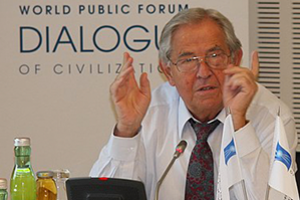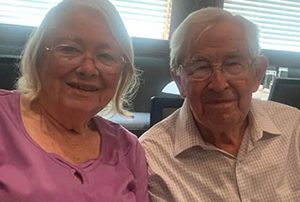
The Kroc Institute for International Peace Studies lost a longtime supporter and faculty fellow emeritus when Winfried “Fred” Dallmayr, the Packey J. Dee Professor of Political Theory at the University of Notre Dame, died on June 5 at the age of 95.
“Fred was a giant in political theory and had great enthusiasm for the global work of the Kroc Institute,” said George A. Lopez, Rev. Theodore M. Hesburgh, C.S.C., professor emeritus of Peace Studies. “Fred often appeared on panels the Institute hosted and served on dissertation committees. His thoughtful engagement added both philosophical depth and a cosmopolitan flair to many discussions.”
Added Anne Hayner, the Kroc Institute’s associate director for Alumni Relations, “Fred was a warm, caring and insightful colleague who inspired and challenged many of our students over the decades. And he remained active after retirement – I was happy to see him at a Kroc lecture just last year.”
Mirroring Hayner’s comments, Shinkyu James Lee, a Kroc Institute Ph.D. alum, posted on Facebook, “I’m also saddened by the recent passing of Fred Dallmayr, who graciously agreed to serve on my dissertation committee and provided me with insightful comments. He’ll be missed.”

Dallmayr’s legacy is marked by a distinguished academic career. An internationally recognized political theorist and philosopher, he specialized in modern and contemporary European thought, as well as in comparative philosophy and non-Western political thought, cross-cultural dialogue, and global human rights. After earning his Ph.D. at Duke University, Dallmayr taught at Purdue University before joining Notre Dame in 1978, where he remained for the rest of his career. Among his many academic accomplishments are service as president of the Society for Asian and Comparative Philosophy, an advisory member of the scientific committee of RESET – Dialogue on Civilizations (Rome), the executive co-chair of World Public Forum – Dialogue of Civilizations (Vienna), and as a member of the supervisory board of the Dialogue of Civilizations Research Institute (Berlin).
“In Fred Dallmayr, students happily discovered in a single human being a synthesis of the very best elements and most compassionate ethics arising from all major religious traditions, critically applied to contemporary violent conflicts and peacemaking efforts,” said Robert C. Johansen, professor emeritus of Political Science and Peace Studies.
“Fred conveyed a deep understanding and appreciation of these traditions, accompanied by a towering intellectual grasp of what differentiated peacebuilding that expressed inclusive identities from a narrower form of nation-building that extolled an exclusive identity.”
Dallmayr was the author of 40 academic books and co-editor of 20 more, among them “Peace Talks: Who Will Listen?,” “Achieving Our World: Toward A Global and Plural Democracy,” “Dialogue Among Civilizations: Some Exemplary Voices,” “Beyond Orientalism: Essays on Cross-cultural Encounter,” and “Alternative Visions: Paths in The Global Village.”
His book “Peace Talks: Who Will Listen?” applied the challenge of the 16th century scholar Desiderius Erasmus in “Querela Pacis” (The Complaint of Peace) to the evolution of international law and global ethics, and contemporary times – a natural bridge to the work of the Kroc Institute.
Born in Ulm, Germany in 1928, Dallmayr was impacted personally, emotionally, and spiritually by the trauma of WWII. He sought to understand peace through political and theological studies, and enthusiastically pursued spiritual truth, connecting the roots of Western and non-Western belief systems. As a professor emeritus at Notre Dame, he continued to write, co-author and edit books until last year. Dallmayr spoke fondly of his friendship with Rev. Theodore M. Hesburgh, C.S.C., president emeritus of Notre Dame, and his friendships with colleagues around the world.
"Fred was a friend and associate of Kroc for many years, and always a wise voice of wisdom and encouragement for my work,” said Professor Emeritus of the Practice David Cortright. “I have great admiration for Fred; he had a brilliant mind and a big heart.”
Reflecting on the loss of Dallmayr, Johansen described him as a highly esteemed political philosopher who exuded universal values of peace and human rights. “No one could have been a better friend and spiritual supporter of the students and faculty at the Kroc Institute, and of the vision of Father Hesburgh and Joan Kroc, than Fred Dallmayr,” he said.